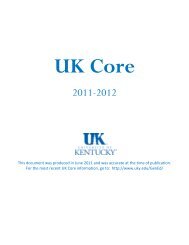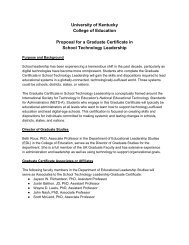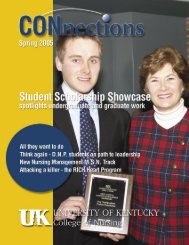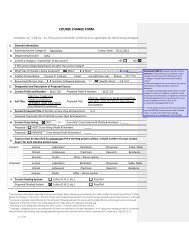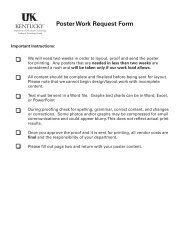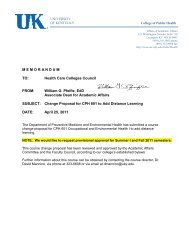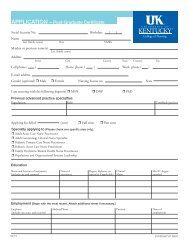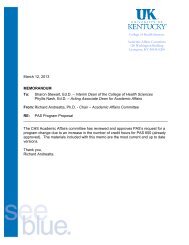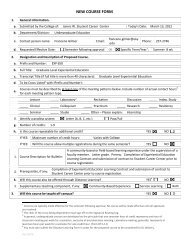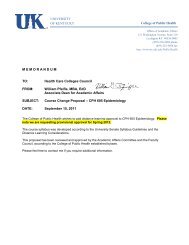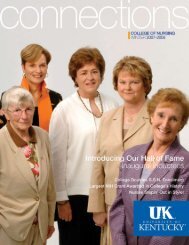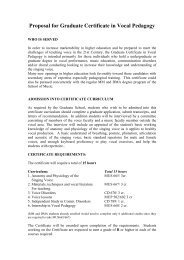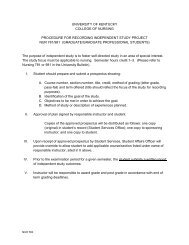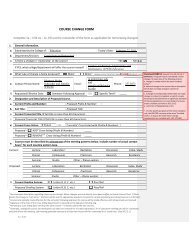05-06 Graduate Student Handbook.pdf - University of Kentucky
05-06 Graduate Student Handbook.pdf - University of Kentucky
05-06 Graduate Student Handbook.pdf - University of Kentucky
Create successful ePaper yourself
Turn your PDF publications into a flip-book with our unique Google optimized e-Paper software.
Technical Standards - <strong>University</strong> <strong>of</strong> <strong>Kentucky</strong> College <strong>of</strong> Nursing<br />
http://www.mc.uky.edu/nursing/StuResources/grads/handbook20<strong>05</strong>-<strong>06</strong>/tech_stand.htm<br />
Page 1 <strong>of</strong> 3<br />
2/23/2011<br />
Technical Standards<br />
The mission <strong>of</strong> the <strong>University</strong> <strong>of</strong> <strong>Kentucky</strong> College <strong>of</strong> Nursing, as it relates to education, is to<br />
prepare students for the pr<strong>of</strong>essional practice <strong>of</strong> nursing through programs <strong>of</strong> undergraduate<br />
and graduate education. <strong>Graduate</strong>s <strong>of</strong> the College must demonstrate competencies in<br />
intellectual, social, and physical tasks that together represent the fundamentals <strong>of</strong> nursing.<br />
Applicants and students are judged not only on their previous scholastic abilities and<br />
achievements, but also on their intellectual, emotional, and physical capacities to fulfill the<br />
requirements <strong>of</strong> a program <strong>of</strong> study.<br />
Standards <strong>of</strong> admission are established by the faculty. Faculty groups recommend admission <strong>of</strong><br />
applicants based on information contained in the application, and where applicable, letters <strong>of</strong><br />
recommendation and personal interviews.<br />
Nationally recognized organizations that accredit the programs <strong>of</strong> the College require a broad<br />
development <strong>of</strong> knowledge, specialized skills, and behaviors that prepare students to deliver<br />
general or advanced nursing care. Courses in nursing and the basic sciences provide a core <strong>of</strong><br />
knowledge necessary for clinical practice. Clinical courses include diverse experiences in both<br />
inpatient and outpatient settings. Together these lead to a level <strong>of</strong> competence expected for<br />
practice.<br />
The following technical standards explain attributes necessary to complete the educational<br />
programs in nursing. These standards describe the essential functions students must<br />
demonstrate and are requirements for entrance, continuation, and graduation.<br />
The College will consider any applicant who demonstrates the ability to perform, or to learn to<br />
perform, the skills listed here. An applicant is not required to disclose the nature <strong>of</strong> any<br />
disability, but an applicant with concerns about these technical requirements is strongly<br />
encouraged to discuss the issue with the assistant dean for the particular program. If<br />
appropriate, and upon request from the applicant, reasonable accommodations for a disability<br />
will be provided.<br />
Certain chronic or recurrent illnesses and problems that could interfere with patient care or<br />
safety may be incompatible with nursing education or practice. Some illnesses may lead to a<br />
higher likelihood <strong>of</strong> student absences and should be carefully considered. Deficiencies in<br />
knowledge, judgment, integrity, or pr<strong>of</strong>essional attitude may jeopardize patient care, and as a<br />
result become grounds for course failure and possible dismissal from a nursing program.<br />
<strong>Student</strong>s must possess aptitude and abilities in five areas: observation; communication;<br />
sensory and motor coordination and function; conceptualization, integration, and<br />
quantification; and behavioral and social skills, abilities, and aptitude.<br />
Observation<br />
<strong>Student</strong>s must be able to observe a patient accurately, at a distance and close-up, noting<br />
nonverbal as well as verbal signals. Specific visual tasks include, but are not limited to:



